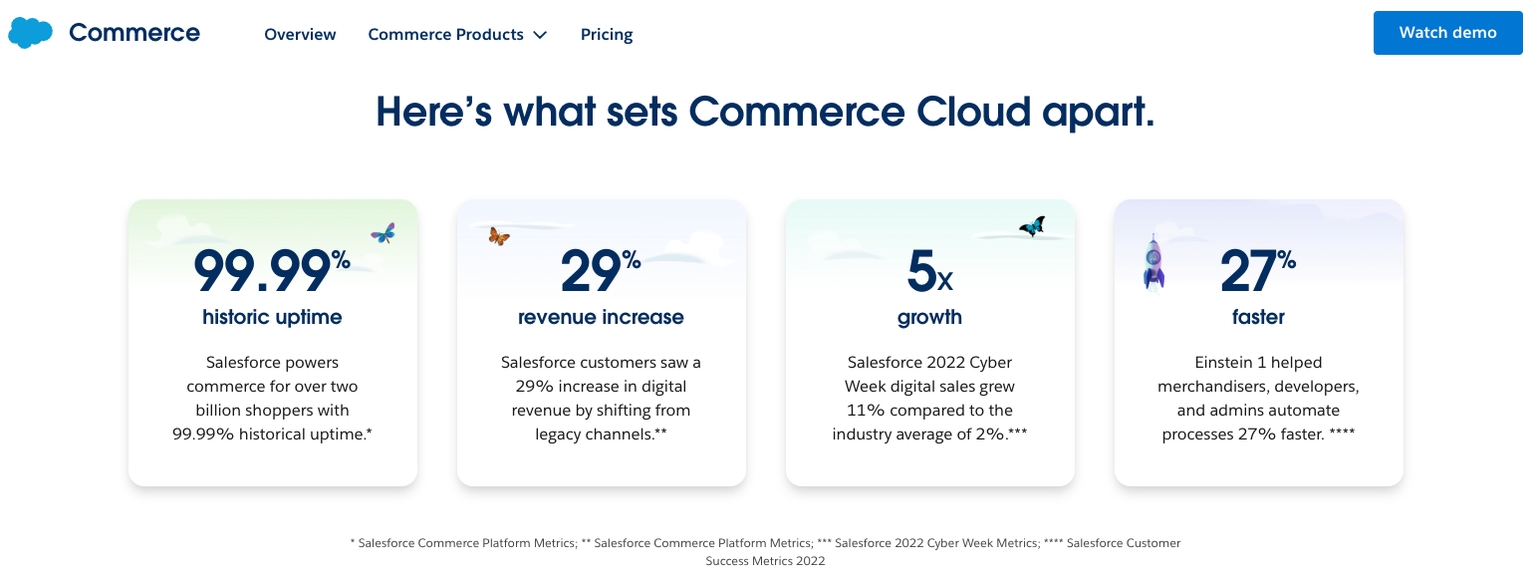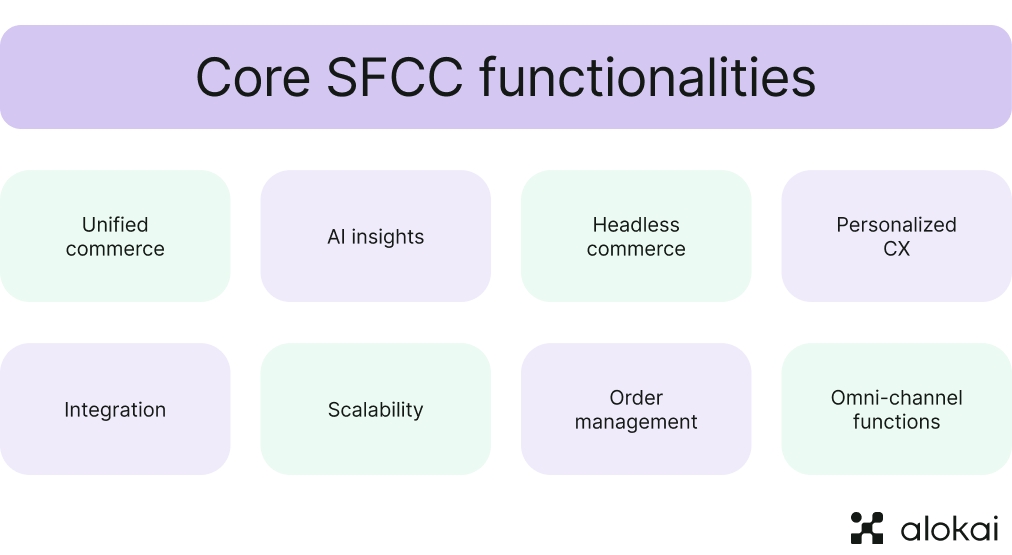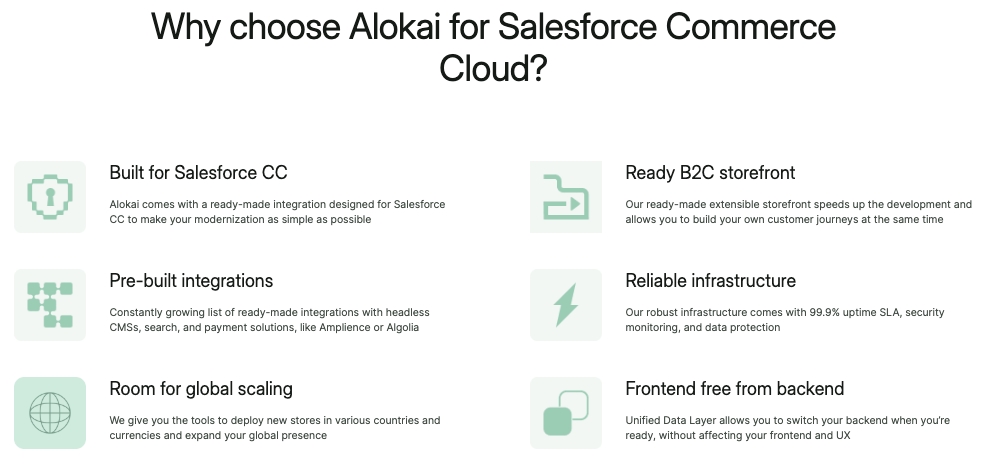Salesforce Commerce Cloud is a cloud-based ecommerce platform that helps businesses boost online sales and improve customer experiences. If you’re wondering what is Salesforce Commerce Cloud, it supports various sales models and offers features like AI insights and personalization. In this article, you will learn about its main functionalities and benefits.
Key takeaways:
- Salesforce Commerce Cloud is a versatile ecommerce platform supporting B2C, B2B, and D2C models, aimed at enhancing customer experience and driving sales.
- The platform features AI-driven insights, a unified commerce approach, and headless commerce capabilities, enabling businesses to personalize shopping experiences and improve operational efficiency.
- Integration with the Salesforce ecosystem and the right implementation partner is crucial for maximizing the benefits of Salesforce Commerce Cloud, ensuring seamless functionality and scalability.
Understanding Salesforce Commerce Cloud
Salesforce Commerce Cloud is a robust cloud-based ecommerce platform tailored for B2C, B2B, and B2B2C customers. Its primary goal is to help brands control their online presence while delivering superior customer experiences. With thousands of websites worldwide utilizing SFCC, it’s clear that this platform is one of the leaders in the ecommerce market.
.png?width=768&auto=webp&format=pjpg&disable=upscale&quality=100&dpr=2)
SFCC aims at boosting sales and streamlining operations through personalized shopping experiences and AI-driven insights. The platform caters to various companies, including B2C, B2B, and D2C organizations. This comprehensive approach ensures that businesses of all types can benefit from SFCC’s powerful capabilities.
But how did SFCC evolve into the powerhouse it is today?
The evolution of Salesforce Commerce Cloud
The journey of Salesforce Commerce Cloud began in 2016 when Salesforce acquired Demandware, a leading provider of cloud-based ecommerce solutions. This acquisition marked a significant milestone, as Salesforce leveraged Demandware technology to create a robust platform that would become SFCC. Initially branded as Salesforce B2C Commerce, the platform underwent further evolution with the acquisition of CloudCraze in 2018, expanding its ecommerce capabilities.
This evolution culminated in the rebranding to Salesforce Commerce Cloud, reflecting its comprehensive offerings for B2C and B2B commerce. Integrating these technologies allowed Salesforce to develop a platform that delivers personalized customer experiences, increases customer engagement, and supports seamless shopping across various channels.

Core capabilities of Salesforce Commerce Cloud
Its core capabilities are at the heart of Salesforce Commerce Cloud, designed to drive higher conversions and enhance customer engagement. The platform supports B2B, B2B2C, and B2C commerce models, each tailored to handle different sales models effectively. SFCC maximizes conversions through real-time data integration into digital storefronts, optimizing cart and checkout experiences.
Moreover, SFCC offers extensive customization capabilities and integration with Salesforce AppExchange, allowing merchants to access pre-built solutions and extend digital shopping into physical stores. These core capabilities ensure that businesses can provide seamless shopping experiences and deliver personalized customer interactions, ultimately driving growth and loyalty.
Let's take a closer look at the platform's key features.
Key features of Salesforce Commerce Cloud
Salesforce Commerce Cloud has features designed to automate sales throughout the entire customer lifecycle using AI-driven commerce. These features enable businesses to launch their online presence more quickly, scale operations faster, and connect with a broader audience. With a diverse library of prebuilt integrations, SFCC enhances the shopping experience, supporting high traffic and large transaction volumes.
The platform’s key features include AI-driven product recommendations, multi-channel integration, advanced analytics, and powerful marketing tools. SFCC offers integrated tools for digital storefronts, customer loyalty, reporting, and order management. This comprehensive suite of tools ensures seamless transactions across various customer touchpoints, including web, mobile, and in-store.

Unified commerce platform
One of Salesforce Commerce Cloud's standout features is its unified commerce platform, which connects the entire shopping experience across digital channels. Integration with Salesforce Digital 360 unifies marketing, commerce, and service elements within SFCC, delivering a cohesive customer experience. This integration includes digital storefronts, customer acquisition and loyalty tools, reporting and insights, order management, payments, and embedded apps.
For instance, B2B commerce sites on SFCC are designed to handle large or frequent purchases and unique functionalities, such as quick reordering and ease of making bulk purchases. Business customers can access their data directly through web portals. This allows for effective account and order management, creating a seamless shopping experience on online business ecommerce websites.
This unified approach to commerce represents a significant opportunity for businesses globally, estimated at $1.5 trillion.
AI-powered insights with Einstein
Einstein for B2C Commerce, the artificial intelligence component embedded in Salesforce Commerce Cloud, delivers personalized product recommendations to all visitors, enhancing their shopping experience. Using machine learning and predictive analytics, Einstein analyzes customer behavior, purchase history, and preferences to provide smarter, data-driven recommendations.
This personalization leads to increased conversion rates and improved customer experiences.
Headless commerce capabilities
Flexibility is key in digital commerce. Salesforce Commerce Cloud’s headless commerce architecture separates frontend and backend systems, allowing businesses to update the front end without affecting the backend. This architecture enables enhanced agility and customization, fulfilling the needs of headless commerce through robust APIs and composable architecture.
The Composable Storefront in SFCC supports the creation of Progressive Web Apps (PWAs), further enhancing user interactions. You can also use specialized frontend solutions like Alokai for a superior experience. With a headless frontend and the original SFCC backend, businesses can achieve greater flexibility and tailor their digital storefronts to specific needs.
Personalization and customer engagement
Transforming routine shopping into meaningful experiences is a hallmark of Salesforce Commerce Cloud. SFCC enables B2C and B2B brands to deliver personalized, seamless experiences using customer interactions and shopping data, saving time and money.
Several iconic brands have adopted SFCC to enhance their online shopping experiences.
Personalized shopping experiences
Personalized shopping experiences are at the core of Salesforce Commerce Cloud’s offerings. By utilizing customer interactions and shopping data, SFCC drives its personalization strategies, creating tailored shopping experiences that cater to individual preferences.
For example, L’Oréal’s digital transformation strategy has significantly enhanced its direct-to-consumer revenue through these personalized experiences.
Increasing customer engagement
Increasing customer engagement is another critical aspect of SFCC. Creating more personalized and integrated experiences allows businesses to improve customer retention and satisfaction, ultimately driving higher sales. Integrating tools like Slack facilitates real-time communication regarding orders and inventory, enhancing team collaboration and boosting customer engagement.
Integration and scalability
Salesforce Commerce Cloud is designed to integrate seamlessly with Salesforce products and third-party apps, enhancing overall functionality. This seamless integration supports B2C, B2B, and D2C operations, enabling businesses to cater to diverse customer needs effectively.
Selecting the appropriate implementation partner can streamline the integration process, enhancing overall customer insights.
Seamless integration with the Salesforce ecosystem
Integrating Salesforce Commerce Cloud with the Salesforce ecosystem links customer data to CRM and Salesforce Customer 360, providing a complete customer view. Using a single source of truth for customer information, businesses can create personalized, integrated experiences that enhance customer engagement.
Certified partners are crucial in ensuring growth from planning to launch and beyond for SFCC implementations, offering tailored solutions that enhance the customer shopping experience.
Scalability for growing businesses
Salesforce Commerce Cloud’s automatic scalability features allow it to manage fluctuating traffic demands effectively. This ensures the platform can handle traffic spikes seamlessly, supporting businesses with high transaction volumes while maintaining system reliability and performance.
This reliability is crucial for businesses experiencing growth, ensuring they can meet increasing customer demands without compromising on performance.
Future-proofing with Salesforce Commerce Cloud
Salesforce Commerce Cloud allows businesses to adapt quickly to future ecommerce trends, expanding into new markets with a secure and adaptable cloud infrastructure. The platform’s integration of Einstein AI helps businesses forecast future trends based on customer behavior and preferences, ensuring they can stay ahead of the curve.
Composable commerce strategy
The composable commerce strategy enables businesses to create tailored ecommerce experiences through independent modular components. This approach enhances scalability and customization by assembling various components, allowing businesses to choose specific technologies for unique digital experiences.
Existing SFCC customers are encouraged to move towards an API-based architecture, supporting a future-proof, composable approach to commerce technology.
Preparing for emerging trends
Preparing for emerging trends is essential for businesses to remain competitive. Currently, 60% of consumers have utilized curbside pickup, with 51% expecting to use it more frequently in the next three years.
SFCC helps brands adapt to these trends, ensuring shopper experiences meet evolving consumer needs.
Salesforce order management
Salesforce Order Management acts as a central hub to oversee all facets of the order lifecycle, from order capture to fulfillment. This system automates the entire order lifecycle, improving efficiency and enhancing customer satisfaction for ecommerce businesses.
Centralized order lifecycle management
Centralizing order lifecycle processes is a key benefit of Salesforce Order Management. SFCC enhances ecommerce efficiency and improves customer satisfaction by providing tools that streamline and automate order lifecycle processes.
Centralized management includes various stages from order creation to fulfillment and delivery, ensuring a seamless experience for both businesses and customers.
Reducing lost sales
Reducing lost sales is a significant advantage of Salesforce Commerce Cloud. Real-time updates on inventory status help businesses minimize lost sales from out-of-stock items. Effective inventory management, combined with real-time insights, ensures that businesses can significantly enhance their sales performance and reduce lost sales.
Choosing the right implementation partner
Choosing an experienced Salesforce partner is crucial for effective implementation of Salesforce Commerce Cloud. Certified Salesforce partners can unlock the full potential of SFCC, leading to better outcomes and minimizing risks.
Partnering with certified Salesforce experts brings valuable customization, integration, and ongoing support during the implementation of Commerce Cloud. These experts ensure a smoother deployment process, helping businesses effectively leverage SFCC features. A good implementation partner should have a proven track record of successful Salesforce Commerce Cloud migration projects.
This partnership not only enhances the deployment process but also ensures that businesses can fully utilize the platform’s capabilities to drive growth and customer engagement.
Setting yourself free from constraints with Alokai

Salesforce Commerce Cloud is a powerful engine, no doubt. But what if you could leverage all the benefits it unlocks AND mix and match the best-of-breed tech stack for your frontend? That's exactly what we enable our customers to do at Alokai! With a dedicated composable frontend for SFCC, we half your time to market and minimize the risks of digital transformation.
